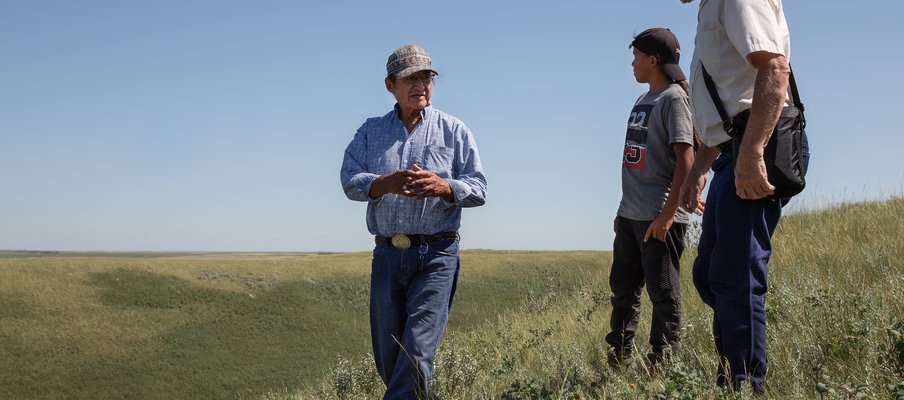New Network of Landholders Upholds Treaty Rights

Related Programs

Treaties are negotiated agreements that define the rights and responsibilities between Indigenous groups and governments. The numbered Treaties were signed in Saskatchewan nearly 150 years ago. Since that time, many barriers to exercising Indigenous inherent rights and Treaty rights have been created. Today, a group of dedicated landholders are working together with Indigenous groups and peoples to address these barriers and share land as Treaties intended.
The Treaty Land Sharing Network (TLSN), which receives support from SaskCulture’s Community Cultural Engagement and Planning Grant, is a group of settlers in Saskatchewan who came together, in partnership with the Office of the Treaty Commissioner, to begin the crucial work of honouring and implementing Treaties, primarily by committing publicly to make land use safe for Indigenous peoples. In part, discussions about Treaty Land Entitlement, the selling of Crown lands, the enactment of the Trespassing legislation and the death of Colten Boushie, a 22year old Cree man who was shot and killed by a nonIndigenous farmer near Biggar, have led to this work.
Since February of 2019, organizers have been approaching ranchers, farmers, and other rural people around discussions of safe access to land for Indigenous peoples.
In November 2019, these settler land holders came together with Indigenous Elders, hunters, and other land users at the Treaty 4 Governance Centre in Fort Qu’Appelle. They spent a full day together, sharing experiences and perspectives on barriers to land access, as well as concrete solutions.
“Many Saskatchewan settlers came forward who were ready to live up to their responsibilities as Treaty people,” notes Hillary Aitken, member of the TLSN Coordinating Committee, adding that nearly 320 committed farmers, ranchers, and other landholders are now part of the network. “In the spirit of sharing the land, members commit to list their name on the online directory and post signs on the land they hold title to, stating “Indigenous land users welcome”, with a contact phone number. Members are found throughout the province in Treaty 4 and 6.”
The Treaty Land Sharing Network plans to continue to expand land access through public communication, direct outreach to Indigenous people, and educational relationshipbuilding opportunities. Educational sessions will include bringing together all participants to share lessons learned and enhance collective understanding of colonization in Saskatchewan and the responsibilities of settlers.
“We were overwhelmed with the positive response to the public launch of the network on July 15, 2021. Media coverage poured in from across the province, even reaching the Globe and Mail, CBC National, and Toronto Star,” notes Aitken.
Financial support from SaskCulture has meant three inperson landsharing events thus far, inperson gatherings, and numerous online educational opportunities such as book clubs or seminars. Indigenous land users already have Inherent and Treaty rights, but the network connects users and landholders to support safer use. Described as “tangible reconciliation in action”, Indigenous land users can access the farmland in the network to gather plants, medicines, hunt, and hold ceremonies.
“We have also launched a website with an online directory, created promotional materials, and distributed nearly 50 signs to landholders,” Aitken adds. “We look forward to continuing to grow the network. We want to focus on direct outreach to Indigenous land users so that they are aware of the network and the land that is available for safe access. We look forward to furthering our goal of enabling safe land access and upholding Treaties.”
Treaty Commissioner Mary Culbertson notes that it is the people who will lead the way in terms of upholding the Treaties at a grassroots and landbased level; everyone is encouraged to participate.
Further information for both landholders and land users can be found at TLSN’s website. A quote from Angela Roque on the website notes “we require access to land in order to exercise Treaty rights and meet the needs of the communities”.
TLSN has not only opened access to privately held land, it has opened a possibility to build respectful and positive relationships based on the Treaty principles of mutual respect and mutual benefit.



